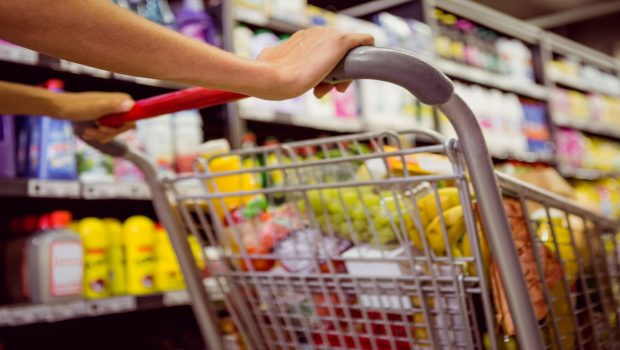Inflation, technology and pandemic life molded consumer grocery behavior in 2022
Photo courtesy: Shutterstock

This is the fourth article in WGB’s Year in Review series. Check the site each day through Dec. 16 for a fresh look back at 2022 in the grocery industry.
Consumers have really been trying to figure out the best grocery shopping strategies this year, and it hasn’t come without some trial and error.
With 85% of consumers being either very concerned or extremely concerned about inflation, 76% of shoppers have changed the way they buy food and 66% are a lot more mindful of how their money is being spent, according to media company NCSolutions
We don’t know if consumers have the right grocery shopping formula in the bag, but we are quite certain that with inflation still around, there are sure to be more consumer behavior changes ahead of us in the upcoming year. In the meantime, here is a recap of consumer behavior changes noted by WGB in 2022.
In-store and online shopping
Customers have been heading back into the stores, as in-store traffic is up 2% compared to last year, according to VideoMining Grocery Shopper Insights, GSI Tracker. Longer stock-up trips are kind of a thing of the past ... for now. Many consumers have shifted to making shorter trips to the store, and getting only what is necessary, resulting in purchases of five items or less on half of their grocery runs.
Another trend this year was consumers’ gravitation to dollar stores. Since April-May this year, dollar stores’ share of wallet has increased 2.1% (17.8% to 19.9%), while specialty/premium stores has decreased 1.1% (18.7 to 17.6%), according to a report from data science firm dunnhumby.
But the idea of shopping online for groceries has become a new normal of sorts for nearly 60% of shoppers, said a report from marketing services company Acosta. Of those consumers who began buying groceries online in the past two years, nearly one in five said they have plans to continue to shop online in the next year.
“More than half of American households are buying groceries online at least occasionally,” said John Carroll, chief growth officer at Acosta.
Lower service fees has been noted as the top reason why online shoppers choose grocery pickup over delivery, said digital-commerce platform Mercatus.
It was also found that seven in 10 online shoppers who actually go into the store to pick up their orders, end up grabbing and purchasing additional items or something they may have forgotten to place in their baskets online, according to Acosta.
Technology
Speaking of ordering groceries online, it turns out that the most-used technology by 67% of consumers is the smart phone. Self-checkout, mobile applications and store mapping are the leading technologies that customers use and want more of, said category growth design firm ChaseDesign in a report about consumer technology use.
Sixty-seven percent of shoppers use their smart phone while shopping, with 55% using the retailer or brand app for price checks and comparisons, discount and promo look-up, and for coupon access or downloads.
But no other area of the store has changed as dramatically as checkout, said ChaseDesign, as 57% of shoppers said they use self-checkout “all the time.”
“The bottom line is that when leveraged properly, tech at retail enables shoppers to enjoy shopping more by making trips quick, cost effective and personalized,” said Joe Lampertius, president of ChaseDesign|JGA.
To meet consumers’ demands, 83% of retailers anticipate increased amounts of technology will be deployed in stores in the coming years.
Private-Label Brands
Forty-percent of consumers have bought more private brands than before the pandemic, and three-quarters of these shoppers plan to continue doing so, according to FMI–The Food Industry Association. With the increasing sales of private-label brands, 83% of retailers said they plan to boost their investments in the segment and that they would like to increase private brands in their stores from 18.2% to 22.6% over the next two years.
Sixty-three percent of consumers feel that private brands are a good value, and 55% purchase them because they are less expensive. Forty-two percent of consumers like the way private-brand products taste.
“When it comes to taste and quality, shoppers clearly see private brands as a good option, on par with national brands,” said Doug Baker, VP of industry relations for FMI.
It's no wonder that The Private Label Manufacturers Association (PLMA) hosted a sold-out trade show in Chicago in November.
WGB noted the following private-label trends at the show: plant-based items, honey, pasta, wines and spirits, and sustainability.
Consumer Awareness: Food Waste
Seventy-two percent of consumers have become more conscious about their level of food waste post-pandemic. With nearly 2.5 billion tons of food going uneaten each year, 61% of consumers feel brands, stores and supermarkets should take notice as well and do more to help reduce waste, said global information technology company Capgemini Invent.
An astounding 91% of consumers said they would prefer to purchase food from companies that are taking steps to reduce waste, and 58% said that in the past year, they have increased spending with companies that focus on reducing waste.
“In this post-pandemic world the last two years, we’ve seen the growth of consumers become more conscious about the level of food waste that they have,” Lindsey Mazza, global retail lead at Capgemini Invent told WGB. “Shoppers who never considered what was in their refrigerator before spent more time in their homes, and more time really valuing the groceries that they had and making use of those. That was this mass education for people, and I think that that stayed with us. We’re now conscientious of it, we’ve had an enlightenment, we’re aware of how we can make a difference.”








Gloss